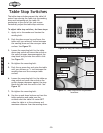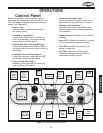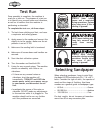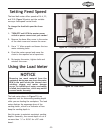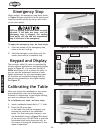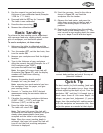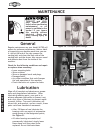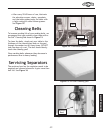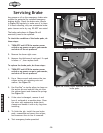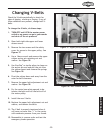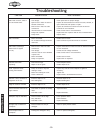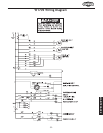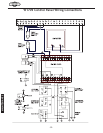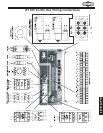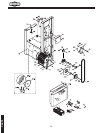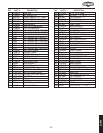
MAINTENANCE
Figure 35. Brake assembly.
Figure 36. Brake caliper removed for access to
brake pads.
Servicing Brake
Any grease or oil on the emergency brake rotor
creates the potential for reduced emergency
braking ability. Check the brake rotor (shown
in Figure 35) regularly to make sure it is clean.
If it needs cleaning, only use automotive brake
parts cleaner and a dry rag. DO NOT use water!
The brake pads shown in Figure 36 will
eventually need to be replaced.
To check the condition of the brake pads, do
these steps:
1. TURN-OFF and LOCK the master power
switch so no power can go to your sander
and shut off the air pressure!
2.
Remove the lower right cover.
3. Measure the thickness of each pad. If a pad
is below
1
⁄8", then replace both.
To replace the brake pads, do these steps:
1. TURN-OFF and LOCK the master power
switch so no power can go to your sander,
and shut off the air pressure!
2.
Use a 14mm wrench and remove the two
caliper anchor pin retaining nuts and
washer. See Figure 35.
3. Use ViceGrip
®
or similar pliers to clamp on
the anchor pin end and pull the pin from
the caliper mount and remove the springs.
See Figure 35.
4. If the rotor is damaged, remove it and
have it surfaced at a machine shop. Clean
the rotor with automotive brake parts
cleaner and handle it with a dry rag when
installing.
5. To finish the job, install the new brake
pads, reassemble and mount the caliper,
and reconnect the air line if removed.
6. Test emergency brake operation!
-28-
Brake
Pads
Retaining
Nut
Rotor
Caliper
Assembly
Anchor
Pins



